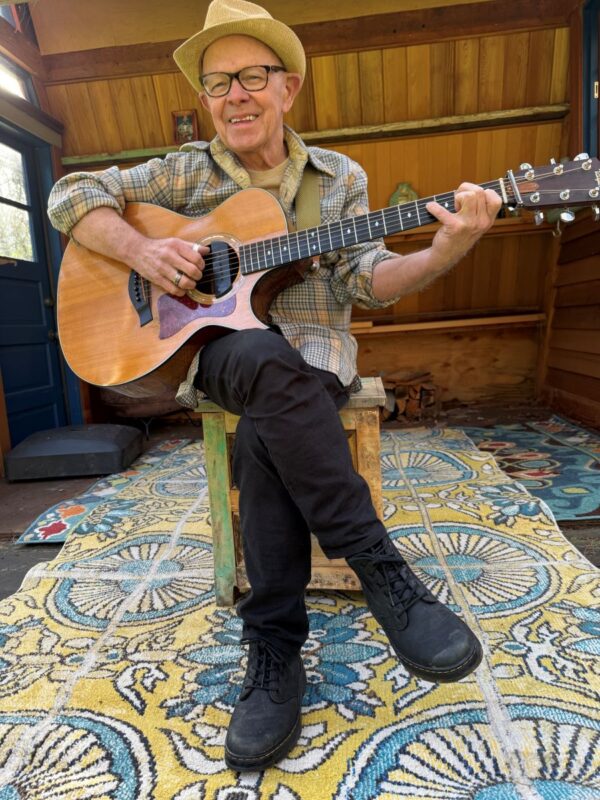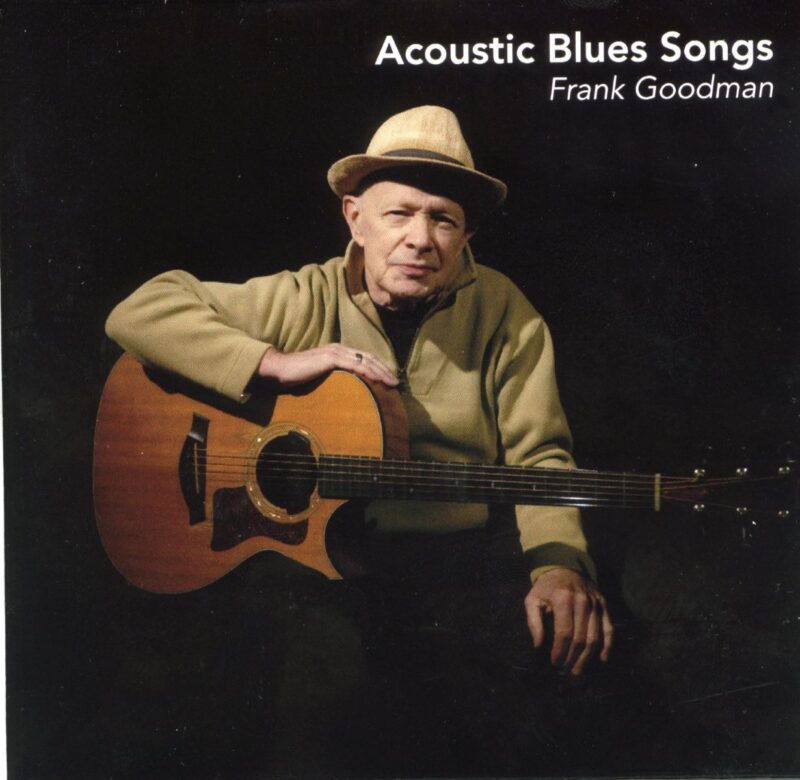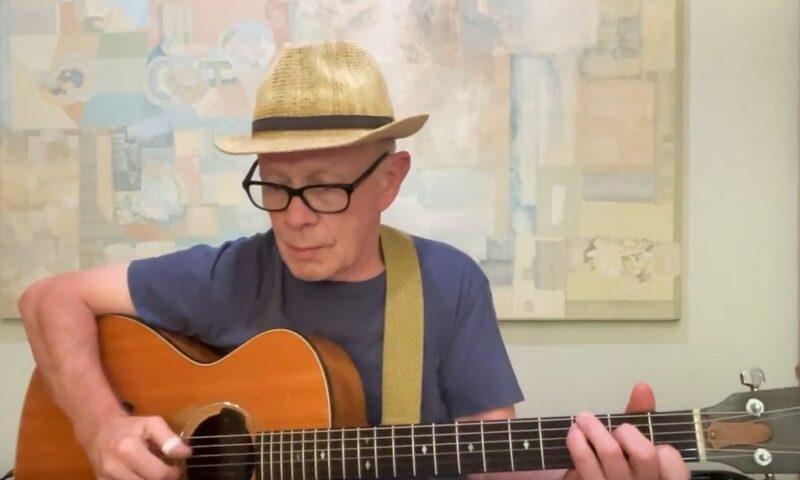The roots & blues singer/songwriter Frank Goodman just released a new album Acoustic Blues Songs (Dundalk Records). You must be of a certain age to appreciate the hard, but light-hearted wisdoms dished out by the swift musico. At 72, Goodman’s 11 easy-going original songs are earnest, the wise words of a mature, baby-boomer writer conversing about the existential reality of his stage in life. Blues fans of his generation will easily relate. How perfect from a marketing perspective. An old dude writing songs for old dudes, without the tired and untrue cliché “Aging like a fine wine”. His song Old Dude Blues sets it straight, “It don’t matter what the people say, it don’t matter much at all, I got no time for opinions.” Most listeners in these social media times will relate to that.
The deft bard Frank Goodman from Yonkers, New York, is not yet well known outside of Portland, Oregon, where he now resides. Relative obscurity is no indicator of skill. This guy can play. Goodman comes out solo with just his sweet-toned 1986 Taylor 712C, sparse with a distinct down-home, back porch vibe. He kept it clean and simple, purely acoustic with no other accompaniment. Just fine alternating-bass fingerpicking a la John Hurt and in the East Coast Piedmont style. His laid-back singing occasionally reminds of Mose Allison and J.J. Cale. He keeps it all mellow and relaxed, yet confident. Goodman’s skilled country blues musicality is impressively sweet and gentle. He dishes out heavy thematic, but keeps it all fun and unpretentious, almost tongue-in-cheek.

Jorma Kaukonen now performs his song Where Have All My Old Friends Gone. That song is indeed one of the highlights of this consistently even album. Like any good bluesman, he takes on heavy topics, but with a light, slow touch like John Hurt. As the song name implies, Goodman explores the question of death, grieving and afterlife, a heavy topic baby boomers confront all too frequently nowadays. He stays on the existentialist thematic on For the Old Times, continuing“Let’s raise a glass to those no longer here.” On My Sweet Dreams, he hits hard on another frequent reality of old age, “My sweet dreams have all been shattered, I don’t mind, and it doesn’t matter, Cause I’m dreaming sweeter dreams today.” He sneaks in more wisdoms on Follow Your Heart, atruehearted “Life is too short” ditty. To break things up he sneaks in a few other themes, like in Please Baby Please, a typical “don’t leave me here” number.
He told thecountryblues: “I started playing guitar in the folk boom of the 60’s. Along with the folk interpreters and the singer songwriters of the era, I was captivated immediately by the sound and the stylings of Mississippi John Hurt. He had such a gentle approach to the blues, and he told a good story. I can’t remember more than a song or two where he’d even bend a string; he’d choose to slide from one note to another instead. More than a lot of the bluesmen I studied through the years, John Hurt felt like a man I could relate to, though I was not from his world.
There was no bravado, no machismo in the man, and this also appealed to me. That the blues didn’t need to be brash, to be badass, loud, or fast. That the blues could be sweet, humble, and deeply human. Just last night I was out at a Public House in Portland and the great Lloyd Jones was singing My Creole Belle., a mainstay of Hurt’s repertoire. The old timey interpreters like Mike Seeger and The New Lost City Ramblers had a huge effect on me, and even more so all the great records of Ry Cooder. Nobody can touch Cooder, not to this day. I have heard recordings of him at 16 that are mind blowing. Cooder introduced his fans to so many great artists of various genres, but my favorite was Blind Blake. Arthur Blake had a funk and jump to his playing that sounded like a piano player, frequently due to the way he would roll two bass notes into the top of a phrase, like “and one.” Little is known about him, and the mystery cemented the legend.

The blues took root in me as a teenager in the suburbs of Philly, a town called Levittown, where all the houses looked the same. Along with Cooder’s influence, we were listening to a young white blues player on Blue Goose, John Miller, and Bert Jansch of Pentangle. But most of all, all the young fingerpickers in our town were dissecting the legendary first record of Hot Tuna. After all, these guys were freaks, hippies and bikers from bands like the Jefferson Airplane. We were also all Grateful Deadheads. But all we knew of Garcia’s fingerpicking was on bluegrass banjo or pedal steel guitar.
By now we were writing songs and starting bands, but I never abandoned my country blues or fingerstyle roots, I just started learning more jazz chords and mixing it all together into eclectic songwriting. My brother Billy and I formed The Goodman Brothers with the heralded Steve Kimock on guitar and eventually brought the band out to Marin County in Northern California in the mid-1970s. Billy is currently a singer songwriter and slide guitar specialist in Berlin.
A lifetime later, I’m churning out records of various genres out of my home studio in Portland OR. For some projects, I use friends to produce, play tracks, or to engineer and master. But for the CD Acoustic Blues Songs, I did everything myself, right up to the Mastering Stage.
It seemed to me that there were quite a few good acoustic blues players and singers to be found, but I wasn’t hearing that many good new blues songs. People were often still recording the classics or recording songs where the lyrics were not really a priority or the essence of the song.
I gathered up all the various kinds of blues songs in the trunk and set to recording in my home studio with a pair of good mics and nothing more. And in these 11 songs, many faces of the blues can be found. Folk blues, Country blues, Jazzy blues, Ragtime blues, Gospel blues.
When I finished the recording, I got in touch with Jorma Kaukonen’s wife, Vanessa. They were both fans of The Goodman Brothers, especially a duo folk record called Crooked Smile. So, I asked Vanessa if Jorma might give me a quote for this acoustic blues record. She said, “Maybe, send me a couple of tracks.” Soon after, she said “Here’s your quote-and Jorma really likes one of those two songs you sent. Send me some lyrics and a chord chart.” I sent her a video instead of me playing it, so Jorma could see how it’s played. It certainly blew my mind a little when she sent me back a video of Jorma watching me play it on his computer and playing along.
It’s a real personal milestone that one of my earliest fingerpicking heroes, Jorma Kaukonen of Hot Tuna, is now performing one of these tunes (Where Have My Old Friends Gone).
When I saw Jorma and Jack Casady perform it as Hot Tuna recently at The Alladin Theater in Portland, his introduction to it was: “This next song we got from one of my heroes that lives around here, Frank Goodman…” That felt like the completion of a beautiful fingerstyle circle.”
Play it again, Frank.
Video: Where Have My Old Friends Gone
